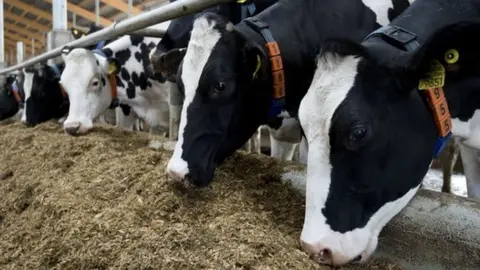Outbreak of bovine TB confirmed in Skye
 AFP
AFPAn outbreak of Bovine TB has been confirmed in a herd of cattle in Skye.
The croft involved is currently under restriction while further testing is undertaken.
A Scottish government spokesman said: "The source of the infection is under investigation."
Although Scotland has officially been "TB free" since 2009, there are still cases. The designation requires less than a tenth of 1% of herds to have had the condition over the past six years.
The cattle involved in Skye have been destroyed.
'Difficult time'
The farmer affected by incident said in a statement through NFU Scotland: "This is an extremely worrying and very difficult time for me.
"The cattle that tested positive on the farm have been slaughtered and further laboratory tests are now under way.
"Waiting for those results is very stressful but I want to get to the bottom of this, get my herd restrictions lifted and get my TB-free status back as quickly as possible and I will work with the authorities to do that."
A spokesman for NFU Scotland added: "This is clearly a terrible time for our member.
"We are working with him and the authorities to ensure he gets the support and advice needed to help him get free of current herd restrictions.
"Thankfully, such TB cases remain rare."
A recent discovery of the disease in a badger in Cumbria appeared to cause concern to grow among farmers in Scotland .
NFU Scotland said it would be a disaster if Scotland was to ever lose its Bovine TB-free status.
Experts have been urging farmers not to panic, but to exercise high levels of biosecurity.

Analysis by Kevin Keane, BBC Scotland Rural Affairs correspondent
Scotland is officially Bovine TB free, but that does not mean we are free of Bovine TB.
Figures from the Department for Environment, Food and Rural Affairs (Defra) show that there were 40 "new-herd" incidents in Scotland during the year to April this year.
These are usually, if not always, caused by infected animals being imported into Scotland.
Farmers who bring cattle from high-risk areas have to test more frequently.
The sector is particularly concerned about protecting its valuable TB-free status since the disease was detected in a dead badger in Cumbria.
But the risk of it crossing the border through wildlife is still much less than through cattle movements.
